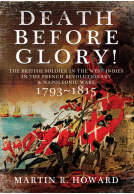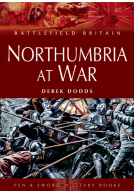Wellington and the British Army's Indian Campaigns 1798 - 1805 (Hardback)
Imprint: Pen & Sword Military
Pages: 320
Illustrations: 30 colour
ISBN: 9781473894464
Published: 18th May 2020
(click here for international delivery rates)
Order within the next 10 hours, 37 minutes to get your order processed the next working day!
Need a currency converter? Check XE.com for live rates
The Peninsular War and the Napoleonic Wars across Europe are subjects of such enduring interest that they have prompted extensive research and writing. Yet other campaigns, in what was a global war, have been largely ignored. Such is the case for the war in India which persisted for much of the French Revolutionary and Napoleonic periods and peaked in the years 1798−1805 with the campaigns of Arthur Wellesley – later the Duke of Wellington – and General Lake in the Deccan and Hindustan. That is why this new study by Martin Howard is so timely and important.
While it fully acknowledges Wellington’s vital role, it also addresses the nature of the warring armies, the significance of the campaigns of Lake in North India, and leaves the reader with an understanding of the human experience of war in the region. For this was a brutal conflict in which British armies clashed with the formidable forces of the Sultan of Mysore and the Maratha princes. There were dramatic pitched battles at Assaye, Argaum, Delhi and Laswari, and epic sieges at Seringapatam, Gawilghur and Bhurtpore. The British success was not universal.
Watch the full review here
Scottish Military Research Group
This compelling study illuminates a part of Arthur Wellesley’s military career that has been largely neglected by historians. The author has provided an absorbing account of Wellesley/Lord Wellington which shows how his actions in India had a significant effect on the development of the British Empire and events through to the modern era. – Highly Recommended
Firetrench
Read the full review here
The ‘Iron Duke’s’ campaigning with the British Army in India at the end of the eighteenth century and the beginning of the nineteenth has been somewhat over-shadowed by the Peninsular War and the Napoleonic Wars across Europe generally. Nevertheless, this is a fascinating and brutal story well-told by Dr Martin Howard.
Paul Nixon
Wellington and the British Army’s Indian Campaigns 1798-1805 ticks all the boxes for me. There’s an index, a bibliography, footnotes, appendices, maps and colour plates. More than this, as well as detailing the actual battles and campaigns, there is fascinating detail about life in the garrison, transportation and arrival in India, Indian sepoys and sickness and disease. In short, Martin Howard covers pretty much all of the bases and writes in a manner that is always engaging, never mundane. It’s one thing to have an interest in a subject, quite another to write about it so compellingly.
This book is hugely useful as a reference source and I’m pleased to see that the author has also written on Walcheren and the British soldier in the West Indies 1793-1815. Santa, if you’re listening…
Read the full review here
Anyone interested in the wars in India will want this book, as will military history students for this period in general.
Beating Tsundoku
Read the full review here
... those whose ancestors took part in any of these engagements will be riveted. Military history enthusiasts will find much to enjoy.
The Families in British India Society.
I heartedly recommend this book to the average history buff and promise an enjoyable and informative read.
Napoleonic Historical Society Journal - reviewed by Todd Fisher
Martin Howard's superb account of the British Army under Wellington in India reads like one of Bernard Cornwell's SHarp novels, or, better still, a Flashman novel. British History at its absolute finest.
Books Monthly
As a result we get a clear image of the varied experiences of British troops in these wars, as well as the varied attitudes of individuals to their Indian allies and opponents. The material on the campaigns is also strong, with good analyses of the various British commanders and their performances. This is a useful addition to the literature on Wellington in particular, giving us a better idea of the background to his time in India than those books that just focus on Wellington.
History of War
Read the full review here
The subject of this book is interesting, but it is the level of research and the quality of the writing that make it both an enjoyable read and a worthwhile study of the period.
1/72 Scale Plastic Napoleonic Figures
Read the full review here
Between 1798 and 1805 the British army plus large numbers of native troops made enormous gains in the conquest of India. Arthur Wellesley played a large part in the campaigns and this book tells that story. He took chances, he tried different tactics, he honed principles which he later developed in the Peninsular. When to move at speed, manoeuvre on the battlefield, dig in, lie down, and keep the men supplied with all their needs were all worked out and tested during his Indian period. In all this luck was on his side. To those who are familiar with Wellington’s later campaigns the book’s final sentence ‘India had been the making of him.’ rings true. But this book is about more than Wellington, it is a very good introduction to the nature of conquest especially in the application of ‘divide and rule’. Additionally for many it will be an eye opener on the power and influence of the East India Company at this time.
Clash of Steel
A jolly good read with a super set of illustrations and the best, most informative, set of maps, all with Northings and scales, that I have seen in a very long time.
We highly recommend this to a wide range of readers.
Read the full review here
Whilst ‘Wellington’ is the focus of the title, this book is an excellent narrative history of the campaigns in India between 1798-1805 and it delivers a broader history than just the great man and his actions. The English political direction and role of the East India Company is well described and the scale and scope of the campaigns and their support is well documented. What becomes clear is that the tactical failings of the numerically superior Indian troops were exploited by the British leadership. The confusion and bravery of British soldiers of all ranks is apparent from the many sources quoted and it makes for sobering reading. The maps and illustrations are good.
Michael McCarthy
Michael McCarthy. Battlefield Guide
About Martin R. Howard
Martin Howard is a former hospital consultant and honorary visiting professor at the University of York. He is a Fellow of the Royal Colleges of Physicians and Pathologists and of the Royal Historical Society. His main interest in is eighteenth- and nineteenth-century warfare, with a particular focus on the human dimension of these conflicts and the lesser-known campaigns. His most recent books in the field are Walcheren 1809: The Scandalous Destruction of a British Army, Death Before Glory! The British Soldier in the West Indies in the French Revolutionary and Napoleonic Wars 1793−1815 and Wellington and the British Army's Indian Campaigns 1798-1805.




















